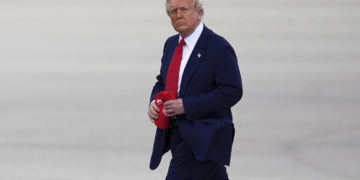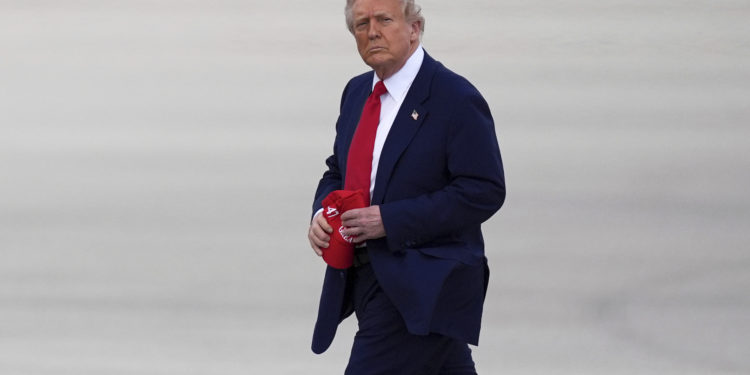President Donald Trump is facing mounting opposition from Republican senators over his sweeping plan to impose steep tariffs on nearly 200 countries, including the United States’ biggest trading partners and allies.
Why It Matters
The pushback—in the form of public statements and support for legislation that would limit Trump’s tariff authority—has become stronger as Wall Street and international markets nosedive amid increased uncertainty about the impact of the tariffs and fears of a global recession.
What To Know
Trump sent Wall Street into a tailspin when he announced on Wednesday that the U.S. would impose a 10 percent “baseline” tariff on virtually all imports and singled out roughly 60 countries for what he described as “discounted reciprocal tariffs.”
He explained that the “reciprocal” tariffs were based on tariffs those countries imposed on the U.S. The numbers Trump cited, however, were inaccurate and the White House later clarified that the formula it used was based on just two variables: the U.S.’s trade deficit with a foreign country divided by that country’s exports to the U.S.
Trump then halved that number to arrive at his “discounted reciprocal tariff,” which he said he was doing to be “kind.”
Wall Street had its worst week in five years in response to Trump’s tariffs, as the U.S. and global markets reeled with recession fears and uncertainty about the potentially devastating impact the tariffs could have. The U.S. dollar also wiped out all its gains since Trump’s reelection.
More than half a dozen Senate Republicans have pushed back on the president’s tariffs so far.
Senator Ted Cruz of Texas
“Tariffs are a tax on consumers, and I’m not a fan of jacking up taxes on American consumers,” Cruz, a one-time Trump rival turned staunch ally, told Fox Business’ Larry Kudlow on Thursday.
“So my hope is these tariffs are short-lived and they serve as leverage to lower tariffs across the globe,” he added.
Joshua Blank, who runs the Texas Politics Project at the University of Texas in Austin, told Newsweek that the state will likely “feel more pain than most” other states as a result of Trump’s tariffs because of the critical role that foreign trade plays in its economy.
Senator Chuck Grassley of Iowa
Grassley recently cosponsored a bipartisan piece of legislation with Democratic Senator Maria Cantwell of Washington that would limit the president’s power to impose and enact tariffs and give Congress more control over the duties.
The measure says that within 48 hours of imposing or increasing a duty, the president must explain to Congress the “reasoning” for doing so and submit “an assessment of the potential impact of imposing or increasing the duty on United States businesses and consumers.”
It also says any new tariffs will expire within 60 days unless approved by Congress.
Grassley’s proposal with Cantwell comes as rural residents in Iowa, many of whom rely heavily on manufacturing and farming, brace for the impact of Trump’s tariffs.
“A trade war will put Iowa farmers directly in the crossfire without getting any closer to the long-term goal of fair trade that values Iowa farmers and workers, Aaron Lehman, the board president of Iowa Farmers Union, told The Des Moines Register in a statement.
Senator Thom Tillis of North Carolina
Tillis indicated to Politico that he backs Grassley and Cantwell’s legislation, telling the news outlet he was “inclined” to support it.
He noted, however, that he’s made no final decision on it and said his staff is still reviewing the text of the bill.
Tillis also warned of the consequences of Trump’s tariffs, telling CNN, “Anyone who says there may be a little bit of pain before we get things right need to talk to my farmers who are one crop away from bankruptcy.”
“They don’t have time, so we’ve got to be crisp on this implementation,” the North Carolina senator added. “Otherwise, we could do damage that’s irreparable to farmers.”
Senator Mitch McConnell of Kentucky
McConnell, the former Senate majority and minority leader, broke ranks along with several other Republicans earlier this week to thwart Trump’s tariffs on Canada, a longtime U.S. ally and key trading partner.
“Make no mistake: Goods made in America will be more expensive to manufacture and, ultimately, for consumers to purchase, with higher broad-based tariffs,” McConnell said. “At a time when Americans are tightening their belts, we would do well to avoid policies that heap on the pain. We ought to strengthen our friendships abroad, and reinforce our allies as pillars of American prosperity and security.”
Senator Lisa Murkowski of Alaska
Murkowski also voted with Democrats on the measure effectively ending some of Trump’s tariffs on Canada.
The bill zeroes in on Trump’s national emergency declaration in February, which his administration invoked to impose a 25 percent tariff on Canada, which is the U.S.’s closest trading partner. Trump claimed that Canada was allowing fentanyl and other drugs to pour into the U.S. when he signed an executive order declaring a national emergency.
Murkowski said Trump’s tariffs would hurt Alaska and called for the president to “find a better way to mutually secure our borders and address fentanyl trafficking than by staring a trade war.”
“While not all Canadian trade practices are fair, I’m keenly aware of the negative impacts in store for Alaskan families and businesses should tariffs drive up the costs of essential goods,” Murkowski wrote on X, formerly Twitter.
“In Alaska … we share more than 1,538 miles of border with Canada,” the Republican senator added. “We are friends, neighbors, partners, and allies when it comes to our economies, our mutual defense, our cultures, and, yes, our trade.”
Senator Susan Collins of Maine
Collins—who frequently votes with Murkowski and is widely viewed as a more moderate Republican—backed her colleagues in their support for the Democratic bill demanding that the 25 percent tariffs on Canada be reversed.
“The fact is, the vast majority of fentanyl in America comes from the southern border,” not Canada, Collins said on the Senate floor.
The Maine lawmaker, whose state borders Canada, also noted that Trump’s tariffs would adversely affect key industries in Maine, including the paper, pulp, lobster and agricultural sectors.
She also took a swipe at Trump’s decision to target partners and rivals alike with his broad tariffs—a fact that came into sharp focus when Trump unveiled tariffs against 185 countries earlier that same day.
“One of my biggest concerns is we should be distinguishing between allies and our adversaries and not treating them the same way,” Collins said.
Senator Rand Paul of Kentucky
Paul has been an ardent and long-time opponent of tariffs, saying that Congress is the only government entity that has the authority to impose and raise taxes, not the executive branch.
The Kentucky senator joined McConnell, Collins and Murkowski in voting with Democrats to reverse some of the tariffs on Canada and wrote on X after the vote: “Tariffs don’t punish foreign governments. They punish American families. When we tax imports, we raise the price of everything—from groceries to smartphones to washing machines to prescription drugs.”
Paul issued another dire warning on Wednesday, saying Trump’s sweeping tariffs could result in the “political decimation” of the Republican Party.
“Tariffs have also led to political decimation,” Paul told Fox News. “When [former President William] McKinley most famously put tariffs on in 1890, they lost 50 percent of their seats in the national election. When [Smoot-Hawley] put on their tariff in the early 1930s, we lost the House and the Senate for 60 years. So they’re not only bad economically, they’re bad politically.”
Senator John Kennedy of Louisiana
Kennedy struck a more measured tone than Paul, noting that he shares Trump’s “objective” on trade “in the long run.”
“But … in the long run, we’re all dead,” Kennedy said after Trump rolled out his plan. “The short-run matters, too. I don’t care what the experts say. We do not know yet the impact of these [tariffs … We just don’t know and anybody who tells you otherwise that says they know has been smoking the devil’s lettuce.”
“I’m not going to bubble-wrap it,” Kennedy told Fox News’ Harris Faulkner. “Now, will it continue? Will we find a bottom and then it’ll start to go back up? I hope so. That’s what I’m pulling for.”
The Louisiana senator also said that the U.S. is in “uncharted waters” and the “economic unknown.”
Almost no House Republicans—who are much more aligned with the president than their Senate counterparts—have spoken out against Trump’s tariffs so far.
On Friday evening, Representative Don Bacon of Nebraska became the first House Republican to publicly come out against the president’s tariffs, saying he will introduce a companion bill to Grassley and Cantwell’s Senate bill to rein in Trump’s tariff powers and give Congress back that authority.
Politico first reported on Bacon’s plans, which he later confirmed to Axios.
The Senate bill reversing Trump’s Canada tariffs will almost certainly fail in the GOP-led House of Representatives. Similarly, if Grassley and Cantwell’s measure passes the Senate, it will likely tank in the House.
What People Are Saying
Trump blasted the four Republicans who voted to roll back his Canada tariffs and urged them to “get on the Republican bandwagon,” writing on Truth Social: “To the people of the Great States of Kentucky, Alaska, and Maine, please contact these Senators and get them to FINALLY adhere to Republican Values and Ideals. They have been extremely difficult to deal with and, unbelievably disloyal to hardworking Majority Leader John Thune, and the Republican Party itself.”
Trump said things are “going very well,” even as the stock market nosedived this week in response to his tariff plan: “It was an operation, like when a patient gets operated on and it’s a big thing. I said this would exactly be the way it is. We have six or seven trillion dollars coming into our country and we’ve never seen anything like it.”
He added: “The markets are going to boom, the stock is going to boom, the country’s going to boom. And the rest of the world wants to see, is there any way they can make a deal. They’ve taken advantage of us for many, many years. And many years we’ve been at the wrong side of the ball and I’ll tell you what, I think it’s going to be unbelievable.”
Vice President JD Vance echoed his boss, telling Newsmax on Thursday evening: “We’re feeling good. Look, I frankly thought in some ways it could be worse in the markets because this is a big transition.”
What Happens Next
A 25 percent tariff on auto imports, which Trump had announced before unveiling this week’s sweeping tariffs, took effect on Thursday. His 10 percent “baseline” tariff is set to take effect on Saturday and his “discounted reciprocal” tariffs will kick in on April 9.
Update 04/04/25 8:20 p.m. ET: This story has been updated with additional information.
The post Full List Of Republicans Sounding The Alarm On Trump Tariffs appeared first on Newsweek.



















